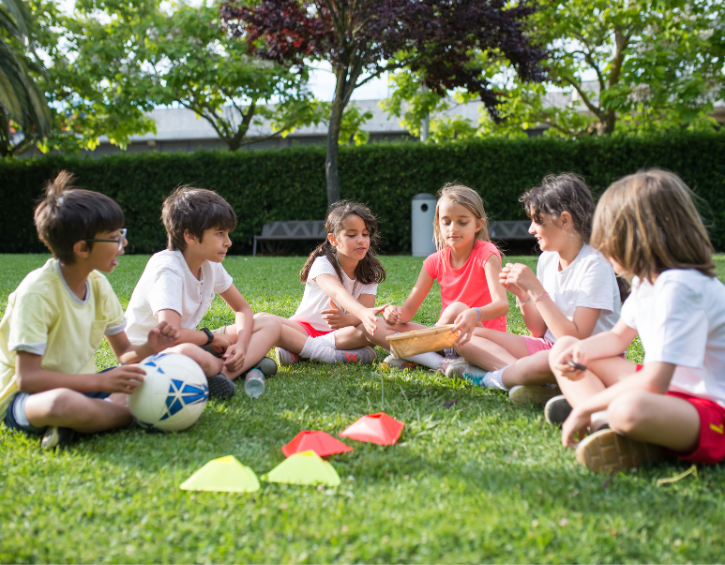How to Set Your Child Up For Social Confidence? Proven Ways to Develop Interpersonal Skills from a Young Age
Nothing compares to witnessing our children grow into capable individuals before our eyes. Their development journey has many special milestones, one of the most important being cultivating social skills. This involves more than just interacting with others – it’s nurturing emotional intelligence to set them up for success.
Let’s support their social growth together. We’ll explore practical strategies to help our kids build strong social abilities and share heart-warming moments, laughter, and quality time along the way.
Getting cozy with your favorite drink in a relaxing spot as we uncover the secrets to raising socially skillful, confident children would be best. We’ll delve into childhood development, guided by care and love, to empower kids in relationships.
Join us in equipping our kids with the tools they need to navigate social connections. With unwavering compassion and poise, they’ll form meaningful bonds.
Let’s begin this rewarding venture of preparing children to thrive in a society of diverse personalities and interactions.

Leading by Example Makes a Difference
Parents serve as our children’s primary role models and teachers. Our actions and words make lasting impressions on their young minds. By demonstrating compassionate social skills like kindness, empathy, and attentive listening, we provide powerful examples for them to follow. Whether showing respect, resolving conflicts calmly, or expressing gratitude, our behaviors become valuable social lessons.
Imagine gathering as a family for dinner and having intimate conversations about your daily experiences. Share stories of how you practiced consideration with co-workers, lent a supportive hand to struggling friends, or showed sympathy to neighbors in need.
Unknown to you, your child’s eyes spark fascination as they observe your graceful social interactions. At that moment, you plant the seeds of social abilities that will blossom into meaningful connections.
Parents play a fundamental part in shaping children’s social competencies. Our conduct leaves an indelible impact on our children’s attitudes and habits. Modeling constructive social conduct is vital for developing kids’ skills.
Exhibiting virtues like warmth, patience, and fairness sets a positive example for children to emulate. Whenever we demonstrate kindness, empathy, or active listening, we provide a roadmap to follow. Sharing tales of how we treated people with care, supported them in hardships, or expressed sympathy helps our kids understand these values.
Now that we recognize the influence of modeling positive social behaviors let’s examine other effective ways to cultivate our children’s abilities.

Emotional Intelligence Leads To Improved Relationships and Happiness
Developing empathy and emotional intelligence is vital for building strong interpersonal bonds. Teaching children to identify and articulate their feelings establishes the foundation for empathetic understanding, leading to deeper connections.
When we actively listen and respond sensitively to our kids’ emotional expressions, we help them develop emotional intelligence for more authentic relationships.
Imagine your child comes home distraught after a disagreement with their best friend. Rather than dismissing their hurt or jumping to solutions, you sit with them and gently ask, “What might your friend be feeling right now?” This exchange shows the importance of recognizing others’ emotions and reconciling them.
Walking them through this process, you help them understand diverse situations and react thoughtfully, laying the groundwork for lasting human connections.
Guiding our children to comprehend and manage their own emotions enables them to build meaningful bonds built on mutual understanding and compassion.
Role-playing Social Situations for Learning through Fun and Imagination
Role-playing is an engaging, hands-on way to help kids practice social interactions. By pretending together, they can act out greeting a new friend, taking turns with toys, or resolving conflicts kindly – allowing them to try out different responses in a safe setting. Children can build critical social-emotional skills like empathy, communication, and problem-solving as their imagination comes alive.
Imagine sitting on the floor, role-playing customers at your child’s pretend store. As they eagerly take on the shopkeeper role, you act out happy and difficult patrons. You creatively brainstorm ways the shopkeeper can handle challenges with patience and understanding.
Through this light-hearted role-play, your child gains the confidence to approach real social situations gracefully. They learn how their words and actions affect others. By role-modeling scenarios, you give them valuable skills to navigate interpersonal relationships smoothly.
Role-playing equips kids with the flexibility and poise to cooperate, share, and resolve conflicts. By incorporating role-play into your quality time together, you have fun and prepare your child for social success.
Understanding Everyone’s Personal Space
Understanding personal space and boundaries is essential to developing social skills. As parents, we play a crucial role in teaching kids about consent and seeking permission before physical contact. By practicing appropriate limits, we demonstrate that respecting others’ space signifies respect and care.
For example, imagine your excited child rushing to hug their grandparents. You gently remind them, “Let’s ask Grandma first if she wants a hug.” As they tentatively ask, they see Grandma’s delighted reaction as she embraces the hug.
In this precious moment, you instill the importance of minding personal boundaries and considering others’ feelings. Children learn that affection should be a choice, not an expectation. By guiding them to ask first, you help them value consent and comfort when interacting.
Respecting physical boundaries and demonstrating thoughtful behavior teach children the essence of healthy social skills – to interact with others in a caring, consensual manner.
Importance of Basic Etiquette Promoting Thoughtful Interactions through Good Manners
Imparting basic manners and etiquette, like using polite language and acting respectfully, creates a pleasant setting where everyone feels appreciated.
As parents, consistently praising kids’ efforts helps make courtesy a natural part of their communication style.
Imagine at dinnertime hearing your child politely request the salt shaker by saying, “Please.” This small act warms your heart, highlighting the importance of these thoughtful gestures.
Witnessing your child adopt considerate habits reinforces that manners signify care for others. Though minor, politeness lays the groundwork for ongoing generosity, empathy, and mindfulness as your child grows.
By promoting graciousness through simple day-to-day actions, parents plant the seeds of social awareness that blossom into harmonious relationships. Teaching etiquette is an investment in your child’s future ability to spread kindness.
Active Listening Skills are The Key to Meaningful Connections
Active listening is a vital social skill that builds mutual understanding. By guiding children to make eye contact, nod along, and respond fittingly when someone speaks, we teach them the art of engaged conversation.
When kids feel truly heard, it promotes empathy between both parties. Social interactions become enriched.
Visualize your child excitedly sharing a story from their school day. You set aside distractions, meet their gaze, and tune in fully to each detail. Seeing their expression of excitement and joy as you focus on them swells your heart with love. You realize the power of listening with your complete presence at that moment—conveying that their perspective matters.
As parents, when we show active listening, we demonstrate to kids that someone’s thoughts and experiences have value. Our undivided attention affirms them and strengthens bonds. Developing this fundamental skill early on nurtures compassionate communication, trust, and lasting social connections.
Teaching Kids to Resolve Conflicts through Communication
Conflicts are inevitable in human relationships, making it vital to guide kids through disagreements constructively. As parents, we can help them develop problem-solving and communication skills by discussing disputes with siblings or friends. Encouraging compromise and fair solutions increases harmony, empathy, and stronger bonds.
Let’s say that your child and their friend are arguing over a shared toy. Rather than jumping in, you hold back as they take turns expressing their feelings. You watch them resolve their dispute by finding a satisfying solution.
At that moment, you realize that conflict resolution is not about winning but finding peace through understanding one another’s perspectives. Helping kids identify win-win scenarios preserves the joy of relationships, even through disagreements.
By teaching compromise and compassion during conflicts, we equip children to resolve issues cooperatively and strengthen their connections.
Handling Rejection and Failure with the Right Mindset
Failure doesn’t mean facing defeat – it can be a chance for growth. As parents, we can teach kids to draw wisdom from setbacks and develop emotional resilience when plans go awry.
Urging them to view hurdles as opportunities to improve, creates a constructive mindset toward overcoming challenges. This builds their self-confidence and inner strength.
Imagine your child returns home disheartened after not making a sports team player. Rather than dismissing their feelings, you listen to their disappointment.
To ease their distress, you help them acknowledge their emotions while focusing on their accomplishments so far. Your encouragement inspires them to regain motivation and keep pursuing their passion.
Through this journey of perseverance, they learn that stumbles provide insights to pave the way for future success. You teach them that single outcomes don’t define their self-worth.
Guiding kids to harness positivity through difficulties gives them the tools to bounce back from life’s inevitable setbacks.
Developing a Positive Attitude in Kids
Developing a positive mindset is powerful for building strong social skills in kids. Encouraging optimism and focusing on the good in people creates an uplifting environment for friendships. Celebrating achievements and praising efforts enhances self-esteem and motivates kindness and joy in relationships.
For a minute, just think that your child is receiving a handmade thank-you card from a friend for support during a difficult time. As they read the sincere words, their faces beam with delight. You highlight their thoughtfulness and compassion, reminding them of their positive impact.
In this precious moment, you witness the ripple effect of positivity – the happiness that flows from giving and receiving kindness, creating far-reaching connections.
By reinforcing an upbeat attitude, we help kids recognize their influence and find fulfillment in bringing joy to social interactions. Fostering optimism lays the foundation for considerate, caring relationships.
Concluding Thoughts
As we conclude, we hope you feel equipped to start cultivating essential social skills in your kids from an early age. Remember that we pave the way for meaningful relationships by demonstrating positive conduct, fostering empathy through play, and emphasizing etiquette.
We nourish their emotional growth and social expertise by giving children the tools to work through conflicts, bounce back from disappointments, and maintain an upbeat attitude.
Our love, support, and guidance provide the cornerstones for their interpersonal abilities to thrive. Let’s continue holding their hands and watching them become compassionate, thoughtful individuals whose one-of-a-kind connections enrich society.
Though the parenting journey has challenges, our kids’ future relationships make the effort worthwhile. By developing social skills now, they will spread kindness and build bonds that last lifetimes.
These social skills will also empower them to handle life’s ups and downs while being a force for good. As they make their mark on the world, our kids will touch others through deeds of compassion learned from us. By teaching them to lift peers, include outsiders, and speak with care, we help shape a society where people support and understand each other. Our guidance today manifests in friendships and communities, strengthening humanity tomorrow.

